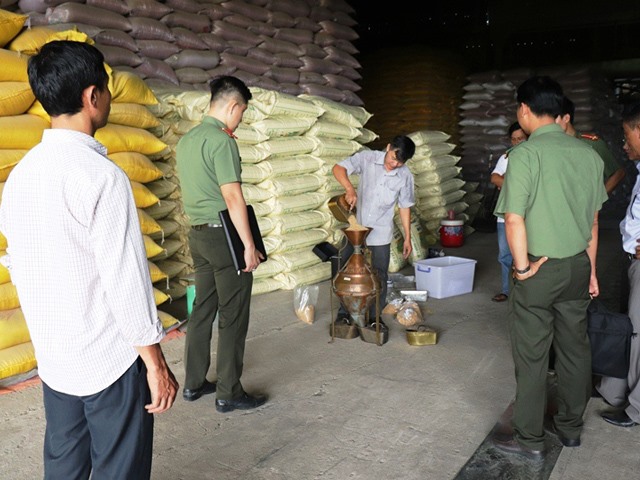 Economy
Economy

As the main rice bowl of the country, the demand for rice seeds in the Cửu Long (Mekong) River Delta was very high.
 |
| Inspectors from the Ministry of Agriculture and Rural Development inspect an enterprise engaging in the manufacture and trading rice seeds. — Photo danviet.vn |
CẦN THƠ — As the main rice producing area of the country, the demand for rice seeds in the Cửu Long (Mekong) River Delta was very high.
But certified seeds produced by professional rice research institutes or enterprises are not enough to support this industry, and only account for 20 per cent of the total supply, meaning that there is no guarantee of quality for the remaining 80 per cent of the supply.
This creates a loophole for enterprises which ignore state regulations by trading in fake and low quality rice seeds, earning high profits, the Nông thôn Ngày nay (Countryside Today) newspaper reported, adding that farmers are suffering the consequences.
Lê Văn Phước, a farmer from Long An Province, said he was surprised to hear that there was a mix of rice strains in his 2.5ha plot of land.
The agent that sold him the rice seeds told him that he had bought the certified variety, when in fact, this was not entirely true. .
He said a lot of farmers in his neighborhood are facing the same problem, but they failed to secure compensation from their supplier.
This happened despite the fact that the sale of rice seeds was placed under State management. Accordingly, enterprises who engage in the trading of rice seeds must obtain licences from the provincial agriculture and rural development department.
In addition, these companies agree to provide certified seeds which meet criteria on moisture, mixed rate and expiration date. To continue their operation, these enterprises must be certified by the Ministry of Agriculture and Rural Development (MARD) before every new crop is sown.
While the issue of trading in low quality rice seeds remains unsolved in the Mekong River Delta, experts are pointing the blame to loose management and lack of staff in relevant departments.
According to Mekong Delta Rice Research Institute, with close to 1.7 million hectares of land used for rice production, the Mekong Delta needs about 400,000 tonnes of rice seeds to produce each harvest.
However, rice seed production facilities can only meet half of the demand.
Unannounced inspections conducted by MARD investigators in Cần Thơ and Đồng Tháp have revealed a number of violations in the trading of rice seeds.
Specifically, inspectors from Cần Thơ City’s Agriculture and Rural Development Department have coordinated with relevant agencies to inspect manufacturing facilities and traders of Hưng Phát Company, taking rice seeds back to the lab for testing.
While “high quality” was printed on its packing, the result of the tests showed that both rice strains didn’t meet the necessary standard.
This raises the question of how many tonnes of unqualified rice seeds have been put on sale since the enterprise set up since 2002.
Various violations were also found at other rice production and trading enterprises in Thốt Nốt District.
Inspectors noted that there were hundreds of tonnes of raw materials and rice seeds in their storage warehouses.
Enterprises failed to show relevant papers relating to certified production at the time of inspection.
The same problem was also detected by the inspection team in neighbouring Đồng Tháp Province.
Enterprises such as Văn Tấn and Thật Hiền, who trade in rice seeds, were found to have copied the packaging of other enterprises, and sold rice seeds with unclear origins in quantities of up to 30 tonnes.
Inspectors from Bạc Liêu Province’s Agriculture and Rural Development said they received a lot of letters from enterprises complaining that their rice seeds were fake or low quality.
Suppliers of rice seeds sometimes trade in low quality seeds which look good, and use packaging with the same labels as certified brands. — VNS




